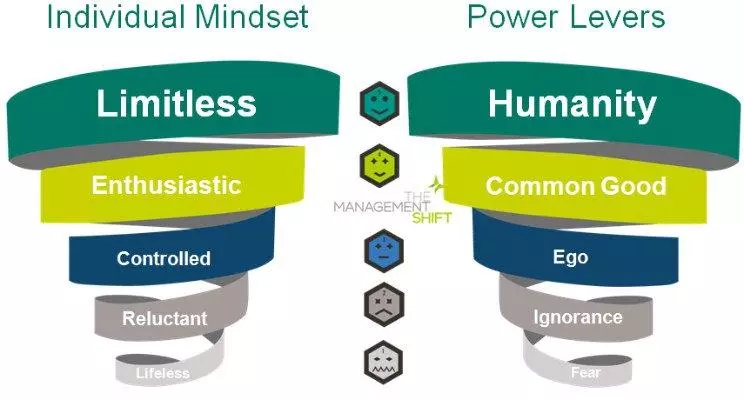The traditional business and political systems do not work anymore and we have been witnessing some profound events recently, from worsening of the crisis in the Middle East to Brexit and US elections.
Conventional wisdom about leadership approaches and management styles of politicians based on autocratic command and control needs to be re-examined as it is not serving its purpose anymore. Complexity Theory tells us that in order for a system to restructure and rebuild itself at a higher level, it needs to go through a phase of chaos. The Big Shift happens on the edge of chaos, so it might be wise to see the world and what is happening on a global political scene through this big picture.

Power levers and individual mindset, ©2018 The Management Shift Consulting Ltd
A new approach to managing employees in the 21st Century is described in the Emergent 5-Level Leadership Model, explained in my book The Management Shift [1] and this approach can be applied to management in politics as well.
Each Level is characterised by specific thinking patterns, behaviour, language used, leadership style and organisational outcomes. For example, Level 1 is characterised by apathy or destructive behaviour, and Level 2 by reluctant behaviour when people do the minimum they need to do to be paid. There is a particularly significant shift from Level 3 (which is ordered and bureaucratic) to Level 4, which is where highly engaged and inventive performance begins. Level 5 is where passionate people combine creatively and with inspiration to make a difference for the world. Moving from Level 3 to Level 4 is to move from ‘I’ to ‘We’. Moving from Level 4 to Level 5 is to move from ‘We’ to ‘The greater good for humanity’.
It is interesting to view these five Levels through the lenses of power, especially in the context of management in politics. There are different types of power levers that are exhibited at each of the five Levels of mindset.
At Level 1, power is based on fear. In the context of politics, dictatorial leaders would operate from this Level. At Level 2 power is based on ignorance and reluctance both from uninspiring leaders and followers. At Level 3 the power is driven by ego of 'charismatic' leaders that often become to a large extent authoritarian. Management style of politicians at this Level is based on command and control, strict hierarchy, centralised decision making, following rules and regulations. Political leaders at this level tend to surround themselves with "yes" man and women, unable to take any initiative or make decision on their own. At this Level, leader's personal status and power is more important that the prosperity of the country they lead and well being of its citizens.
After the Big Shift from Level 3 to Level 4, the power gets driven by a desire to be a force for common good. Political leaders at Level 4 work collaboratively with various stakeholders to achieve prosperity for everybody, they are happy to delegate responsibilities and distribute decision making. At Level 5, the power is driven by love for humanity and desire to make this world a better place. Leaders at Level 5 will work tirelessly to save the planet, tackle global problems of poverty, inequality and will strive for global peace.
Power anchored at Levels 4 and 5 leads to positive ripples, humanised societies and prosperous countries. Power anchored at Levels 1 to 3 produces a negative vortex of energy that leads to diminished prosperity for citizens and society at large.
Where do the prominent political leaders fit on this scale of management styles from Level 1 to Level 5? It is up to each individual leader to identify or not with these descriptions of individual Levels or it could be up to the public to decide.




Leave your comments
Post comment as a guest